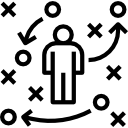INFORMATION AREAS
Active citizenship 
An active citizen is a person who feels that he can change something. He is aware of his possibilities, his behavior and communication is permeated by respect, non-violence, the principles of respect for human rights and everything with respect for the environment. In an ever-changing world, an active citizen is able to contribute to the development of his community. It can recognize threats to a democratic society and help protect and maintain its values.
What will you know?
PARTICIPATION: Participation (from the Latin partem capere, to have a share) means sharing something, participating or participating in something. People should be involved in all decisions that affect them. Participation concerns all areas of modern society - you will find it in the economic, cultural, social and political spheres. Where do you participate?
VOLUNTEERING: According to the most commonly used definition, a volunteer is "one who consciously and freely chooses to devote part of his / her time, energy and abilities for the benefit of others and carries out this activity free of charge". Where do you dedicate your time and your efforts?
ECOLOGY: The science of the interrelationships between organisms and their environment. Do you know when the Earth Day is?
DEMOCRACY: Democracy (literally "people's government") or people's government is a form of government in which the exercise of state (municipal, regional, etc.) power is decided by the opinion of the majority of eligible citizens, most often established by election. Do you know at what age you can vote?
STATE ADMINISTRATION: State administration is divided into Public Administration, State Administration and Self-Government.
Quote
"Being an active citizen is not a question for me, whether I enjoy it or not. I call it a certain spiritual degree. The moment a person really realizes and feels that he is part of the whole, when he sees that every drop affects the quality of the sea, indifference to society is a matter of a basic nature for me, "says actress Simona Babčáková (for Personalities Plus).
What will it bring you?
Awareness that events on one side of the globe affect what is happening on the other and vice versa. Your every decision affects other people and events. As an active citizen, you will think critically about information, learn to argue, take positions and act competently and responsibly.
How about a little professionally?
The world is evolving fast. Globalization. It is not easy to follow changes, trends, everything that happens. Understand: Is the first step to show interest in your surroundings? Then the second step is to get involved (in public affairs)! This will make you an active citizen.
Go to the video if you don't want to read: https://www.youtube.com/watch?v=nymG5z-g0PE
An active citizen is a person who feels that something can change. He is aware of his possibilities, his behavior and communication is permeated by respect, non-violence, the principles of respect for human rights and everything with respect for the environment. In an ever-changing world, an active citizen is able to contribute to the development of his community. It can recognize threats to a democratic society and help protect and uphold its values.
The EU encourages active citizenship: https://www.naerasmusplus.cz/file/4109/ja_obcan_evropy_web.pdf
Active citizenship can prevent corruption, the inefficient functioning of public administration, and a lack of vision for development in many sectors. Become an active citizen!
AND NOW IMPORTANT WORDS
"Even small actions have an effect if a lot of people do them."
Participation
Participation (from the Latin partem capere, to have a share) means sharing something, participating or participating in something. People should be involved in all decisions that affect them. Participation concerns all areas of modern society - you will find it in the economic, cultural, social and political spheres. Where do you participate?
Volunteering
"Volunteers are not paid - not because they are worthless, but because they are priceless." (Mahatma Gandhi).
According to the most commonly used definition, a volunteer is "one who consciously and freely chooses to devote part of his / her time, energy and abilities for the benefit of others and carries out this activity free of charge". Where / where do you dedicate your time and your efforts?
Ecology
The science of the interrelationships between organisms and their environment.
Do you know whent the Earth Day is?
Can you sort waste?
Democracy
Democracy (literally "people's government") or people's government is a form of government in which the exercise of state (municipal, regional, etc.) power is decided by the opinion of the majority of eligible citizens, most often established by election. It can be a direct democracy, where citizens vote on individual issues (laws, decisions, budgets, etc.), or an indirect one, where they authorize their representatives (deputies, etc.), or a combined one, where both procedures are used. In direct democracy, referendums are usually decided, in indirect elections. The way in which citizens exercise their opinion in a democratic state is determined by the constitution.
State administration
State administration is divided into Public Administration, State Administration and Self-Government.
Public administration is an activity related to the provision of public services, the management of public affairs at the local and central level, and the provision of matters in the public interest. Do you know what public services are?
State administration is an activity of the state carried out either directly by state bodies or by other bodies to which the state has transferred the performance of state administration to a certain extent. The central state administration bodies are primarily individual ministries, which have nationwide competence. Have you ever done anything with the state administration?
Self-government is a way of managing a certain unit, where the given entity decides on at least some of its affairs in an autonomous way, ie "it manages itself".






